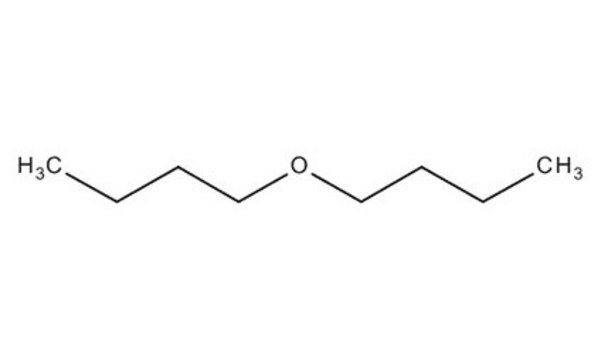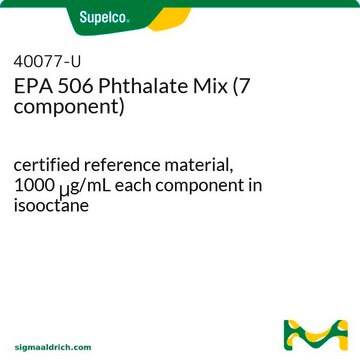8.14732
Diisodecyl phthalate
for synthesis
Synonym(s):
Diisodecyl phthalate, 1,2-Benzenedicarboxylic acid diisodecyl ester
About This Item
Recommended Products
vapor pressure
0.1 hPa ( 20 °C)
Quality Level
Assay
≥99.0% (acidimetric)
form
liquid
autoignition temp.
380 °C
potency
>5000 mg/kg LD50, oral (Rat)
>3160 mg/kg LD50, skin (Rabbit)
bp
250-267 °C/7 hPa
mp
-50 °C
transition temp
flash point 240 °C
solubility
0.00028 g/L
density
0.97 g/cm3 at 20 °C
storage temp.
2-30°C
SMILES string
O(CCCCCCCC(C)C)C(=O)c1c(cccc1)C(=O)OCCCCCCCC(C)C
InChI
1S/C28H46O4/c1-23(2)17-11-7-5-9-15-21-31-27(29)25-19-13-14-20-26(25)28(30)32-22-16-10-6-8-12-18-24(3)4/h13-14,19-20,23-24H,5-12,15-18,21-22H2,1-4H3
InChI key
ZVFDTKUVRCTHQE-UHFFFAOYSA-N
Application
- Evaluating phthalate contaminant migration using thermal desorption–gas chromatography–mass spectrometry (TD–GC–MS): This study investigates the migration of phthalates, including diisodecyl phthalate, from materials like polyvinyl chloride, providing insights crucial for assessing exposure risks associated with everyday materials (Ouchi et al., 2019).
- Toxicity and estrogenic endocrine disrupting activity of phthalates and their mixtures: This research focuses on the health effects of various phthalates, emphasizing the potential endocrine-disrupting properties of compounds like diisodecyl phthalate, which are widely used in consumer products (Chen et al., 2014).
Analysis Note
Density (d 20 °C/ 4 °C): 0.963 - 0.968
Identity (IR): passes test
Hazard Statements
Precautionary Statements
Hazard Classifications
Aquatic Chronic 4
Storage Class Code
10 - Combustible liquids
WGK
WGK 1
Flash Point(F)
527.0 °F - closed cup
Flash Point(C)
275.00 °C - closed cup
Certificates of Analysis (COA)
Search for Certificates of Analysis (COA) by entering the products Lot/Batch Number. Lot and Batch Numbers can be found on a product’s label following the words ‘Lot’ or ‘Batch’.
Already Own This Product?
Find documentation for the products that you have recently purchased in the Document Library.
Customers Also Viewed
Our team of scientists has experience in all areas of research including Life Science, Material Science, Chemical Synthesis, Chromatography, Analytical and many others.
Contact Technical Service











